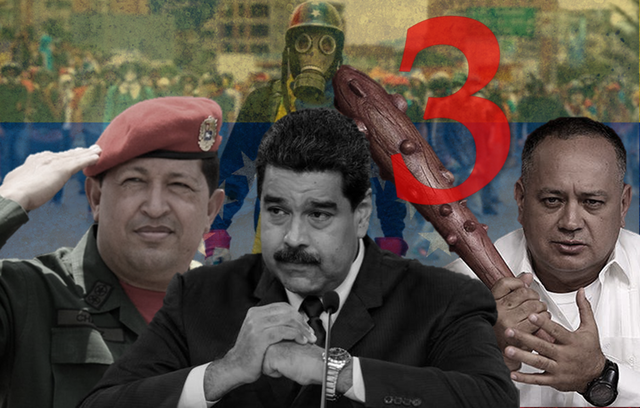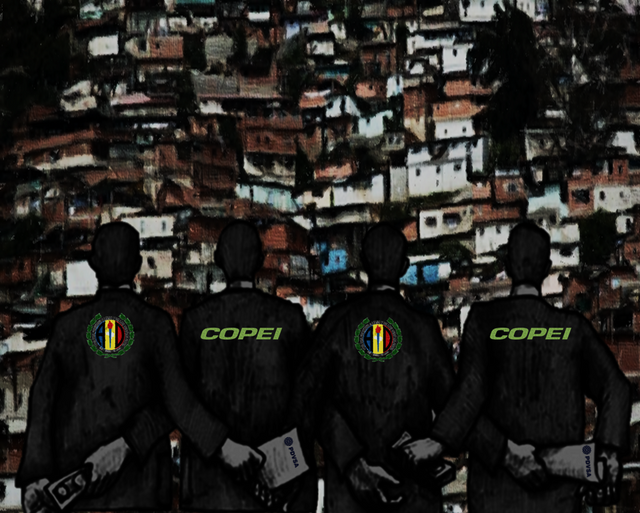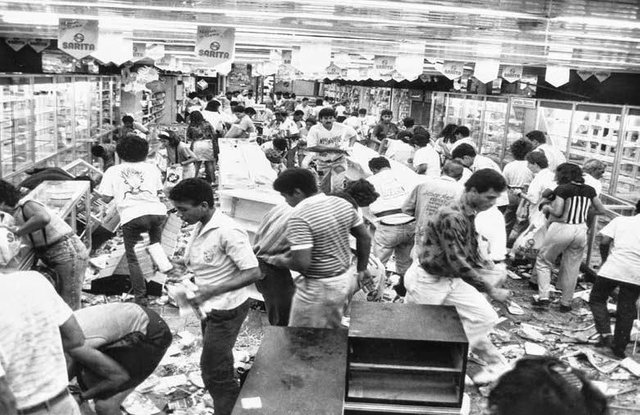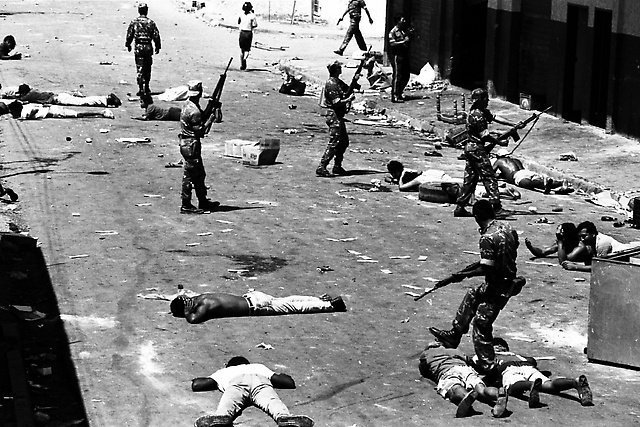How Venezuela met Socialism? brief political history (3/5)

This is the Third Part of a series consisting of 5 publications on the history of Venezuela. Currently this country is experiencing the worst crisis that Western society has known, hyperinflation, shortage of basic supplies, humanitarian crisis, violation of human rights, systematic violation of the rule of law, the highest rates of violent crime, crime, systematic corruption within institutions, indebtedness, unemployment, protests, repression, concentration of power, social division, the return of diseases that had been eradicated, malnutrition, high rates of infant mortality, cultural degradation, massive migration, in short, Venezuela suffers , in a high degree, of all social ills.
Index
1-Dictatorship of Juan Vicente Gómez, Start of the Oil Industry and Cradle of Marxism
2-Rómulo Betancourt vs Marcos Pérez Jiménez
3-Puntofijismo: Rise and Fall of the 4th Republic
4-Hugo Chávez and the Socialist Revolution of the 21st Century
5-Government of Nicolás Maduro
Puntofijismo: Rise and Fall of the 4th Republic

After the fall of Marcos Pérez Jiménez, the main political actors signed a governance agreement called "Puntofijo Pact", in this pact, three of the main parties; (Democratic Action (AD), Independent Electoral Political Organization Committee (COPEI) and Republican Democratic Union (URD), joined to exclude any other political party from the coalition government, especially the Communist Party of Venezuela, which had helped in the clandestine struggle against the Perez Jimenez dictatorship, such a pact was carried out to confront the various adversities that "democracy" faced under the government of Betancourt and his party, since on the one hand, they had a serious problem when dealing with to control the different military cliques that wanted to return to a non-democratic regime, central and based on military power, on the other hand, they needed to exclude the Communist Party of Venezuela because of its anti-democracy character, as well as interference foreign countries by Fidel Castro and the Soviet Union. The pact would guarantee that the main democratic political forces in the s remain united in order to repel their opponents antidemocratic and ensure government control for themselves.
When taking power, Betancourt promotes from the Venezuelan government a meeting with different oil exporting countries that will conclude with the founding of the Organization of the Petroleum Exporting Countries (OPEC). It is in this way that Venezuela becomes the founding father of this organization, with the objective of controlling the supply of oil worldwide and ensuring the greatest possible profit from its oil exports.

From 1960 the government of Rómulo Betancourt would establish the control of change, which with different modalities has been maintained until today, with a slight exception in the period of 1989-1993. Similarly, the "Right to Housing" was established on which politicians would base themselves to build, from the central government, housing of all kinds for the different people of the people of Venezuela, while allowing them to obtain billions of dollars for the private and political entities through corruption in public contracts.
The mandate of Rómulo Betancourt would not be easy, because he would find several attacks on his life and up to three attempts at coups, highlighting the coup attempt called El Carupanazo, which proved the participation of the Communist Party of Venezuela, so that said party ended up being outlawed.
Betancourt also faced opposition from extremist groups and armed units of Marxist-Leninist tendencies. The parties of the PCV and the MIR were active protagonists in the coup acts and other sabotage against the legitimately constituted Government, reason why many of its members were arrested. The communist exportation of armed struggle financed by Fidel Castro for the American continent, also had origins during this time, so the so-called Armed Forces of National Liberation (FALN), a subversive guerrilla group guided by the thought of the Cuban leader, was formed in Venezuela.
The Venezuelan government would have an internationalist character during this time in which OPEC is created and the "Betancourt Doctrine" is launched, with which democratic governments were required to exert political and economic pressure through different mechanisms to all those undemocratic governments.
In 1975, under the government of Carlos Andréz Pérez, a member of the Acción Democrática party, the iron industry was nationalized and an interventionist economic policy was undertaken by the State, which affected the business fabric built during Pérez Jiménez's term. During the first two years of his government he tried to apply a policy of Full Employment and granted immense power to the union representation through the so-called law against unjustified dismissals of 1974. During this same period, in 1976, the oil industry was nationalized seven years ahead of schedule, acquiring all the facilities of foreign companies in national territory, all backed by the reversal law of 1971, which affirmed that all the goods, installations and equipment belonging to the concessionaires inside or outside the concession areas would be taken by the nation without compensation when the different concessions expire.

This is where the VENEZUELAN GREAT PROBLEM is created, because by nationalizing the oil industry, the nation's income multiplies exponentially, but far from investing it in an economically and socially sustainable way, as was done during the Perez Jimenez era, on the contrary, beginning a culture of waste, waste, corruption, protectionism of the national industry, subsidies and unrestrained public spending, which ended up by indebting the nation just when more capital had received.
In the years since 1958, thanks mainly to the extraordinary rise in the price of oil, Venezuela enjoyed immense fiscal revenues for which neither government nor society were adequately prepared. The temptation to spend, together with the idea that it was the State to which the economic development of the country corresponded directly, brought as a consequence the continuous expansion and multiplication of public spending, with the unrealistic intention that, thanks to these investments and its state developments, Venezuela could in a short time become a developed industrial nation, of real weight in the world economy. As a result of this policy of increasing public spending, monetary circulation increased continuously and, with it, employment opportunities and a false appearance of development that did not rest on any stable and productive economic mechanism. There was a dislocating appearance of prosperity that made, apparently, the economic activities multiply, the employment increased, the cities became disproportionately populated and the formation of a middle class affirmed.
All this, however, rested on the false premise that it was not in the presence of true development but of dispersed initiatives subsidized by the State, which lacked the possibility of permanence and reproduction. In reality, what had been done was to increase the oil rent and to bring to its last extremes the consequences of a rentier state that, unwittingly, continually denatured the foundations of genuine economic and social growth.
Arturo Uslar Pietri, A Venezuelan intellectual, historian, writer, television producer and politician.
This generates two of the greatest Venezuelan economic and social problems: the first would be the Dutch disease, which will be found much better explained in the following video:
Here is another video that deals with this issue in a better way, and understanding the whole Venezuelan phenomenon, nevertheless, it is in Spanish, but I will also add it.
At present, Venezuela continues to suffer from the Dutch disease...
The second big problem would be the false belief in the collective conscience, that the State must subsidize people, in this case "the most needy", or take an active participation in the national economy, in such a way that the public in generally immersed in an immense lack of education of all kinds, can not conceive of a decentralized, non-governmental, non-subsidized and free economy, generating a culture in which each individual is a potential dictator, in which freedom means the imposition of one group over another.
This is how Venezuela becomes the largest Social-Democracy in South America, a huge "Welfare State" that would be quite inefficient, a government system totally corrupted by the most powerful party in the nation, "Democratic Action". The institutions were subject to a high degree of politicization, just as they were dominated by political factions that responded to the interests of a particular group in the country. The industry was really inefficient, produced, yes, but the entire national industry depended directly or indirectly on the bonanza that the State and the nation could have for oil concepts.
The cost of 1 liter of gasoline is 0.01 dollars during this time because it was subsidized. (Currently, Venezuela still has the cheapest gasoline in the world precisely because it is subsidized)
Later, in Venezuela, a series of economic regulations began to be established as a result of the crisis that the country was beginning to experience as a result of the mismanagement of oil resources and corruption, which ended up by indebting the nation. The National Commission of Costs, Prices and Wages (CONACOPRESA) is created in order to regulate prices, monitor costs and set wages. Exchange control called RECADI is also implemented to restrict access to foreign currency.
These economic measures began to generate an incredible social unrest, because there was a shortage of some products, black market and excessive corruption. During this period in which strong restrictions were introduced to the economy, in which there was a lot of corruption and low oil prices, the result of the "Dutch disease" was produced. The political and economic model that had been created in the Puntofijo Pact was beginning to expire, people lost their hope in politics and increased popular discontent.
It was during this period in which Venezuela is drowning economically, submerged in debt, economic crisis, scarcity, unproductiveness and corruption, generating what is known as "The Lost Decade", in this era, Venezuelans accustomed to living standards many higher than the rest of the region, are subjected to a social and economic crisis that is not only the result of bad administration, but is produced as the result of economic and political exhaustion of a system that simply did not give for more.
People become impoverished, the middle class is reduced, violence and crime increase, and in the midst of hunger and misery political corruption is increasingly evident, because when money abounds and everyone has a full stomach, difficult for the eye of the plebs is to realize how they fill the pockets of politicians, but another thing is when you are hungry, there are sharpening the senses, and inequality becomes the biggest problem for these people.
At the end of the decade of the eighties, in 1989, Carlos Andréz Pérez, the same man who had a very popular first term during the seventies due to the huge economic surpluses that occurred during the oil nationalization, and that allowed him under his program called "The Great Venezuela" carry out some major works, as well as subsidize the people with a set of social programs, returns to the presidency, this time in a very different situation, was no longer in a Venezuela in bonanza, this was exactly the result of a set of economic and political measures that began with Romulo Betancourt in the sixties, which were aggravated by him in the seventies, and which ended up deepening throughout the eighties What would this man do? now in charge of a nation that was collapsing.
This is how Carlos Andréz Pérez arrives with a vast program of economic reforms characterized by the liberalization of the economy.
Eliminate the control of prices of all products, except for basic foodstuffs.
Restructuring of debt through Brady Bond mechanisms and a loan from the International Monetary Fund.
Unification of the exchange rate through the elimination of control over currencies.
Rationalization and elimination of import tariffs.
Increase in public service rates.
Release of active and passive interest rates.
Reduction of the fiscal deficit to less than 4%.
Increase in the salaries of the public administration, and the minimum wage in the city and in the countryside.
Freezing the charges of public administration.
Privatization of non-strategic companies that were in the hands of the State.
Oil opening program that would allow private participation, mainly of foreign companies, in order to increase production and bring capital to the country.
Increase in the price of gasoline and other petroleum products in the domestic market, with a first increase of 100% (five cents) and 30% in transportation.
This whole set of measures was called "Paquetazo", through which Carlos Andréz Pérez, who was characterized in his first government for having nationalized the oil industry, for social programs and for an ambitious industrial infrastructure program that made the State increasingly bigger, would try to return to the government with the aim of undoing everything they had done during the three decades past the different administrations, in order to clean up the national economy.

There was a spontaneous protest that ended up becoming a wave of mass looting of 900 wineries, 131 supplies, 95 hardware stores, 62 stationeries, 850 merchandise businesses in general, producing up to 154 fires in Caracas, all of which ended up subsequently leading to the excessive use of force by state authorities:
According to the questioned official figure emanating from the government of Carlos Andrés Pérez, the events of February and March 1989 left a total of 276 dead, many injured, several missing and numerous material losses.
"The exact number of civilians killed in these events could never be known," according to the website of the Committee of Relatives of Victims (Cofavic), however, the number of civilians massacred on February 27 and the following days is difficult. to calculate. In fact, it was said that between 2,000 and more than 3,500 people were murdered, although the then Minister Italo del Valle Alliegro counted a little over 300. A ruling of the Inter-American Court of Human Rights, 10 years after the massacre of the people Venezuelan, ordered the Venezuelan State to compensate the relatives of 45 people killed during the social uprising.

In history there are factors that act, in turn, as catalysts for different actions that were already there, but that do not combine to provoke a new situation. How many princes had not been murdered in Europe before the attack on Archduke Franz Ferdinand in Sarajevo? When they kill Francisco Fernando, the First World War breaks out, but it was not the death of this man that was the real cause of the beginning of the war, but a set of predetermined factors that precipitated after this fact.
In Venezuela, many problems that we have described have accumulated, which caused a huge social conflict with the increase in poverty and the exhaustion of political and social institutions.
The second government of Carlos Andrés Pérez came up with the idea of establishing the increase in the price of transport one weekend at the end of the month, when people had already run out of money from their salaries. I must explain first that Caracas is a great service center. It is located in a very narrow valley that has been saturated with population and offices. That is why they have built what they call satellite cities, outside the limits of the capital. Guarenas is one of those "satellite cities", located about 20 kilometers from Caracas. Every morning a large contingent of workers must travel by bus to the capital. Well, that February 27, when trying to board the buses in Guarenas to go to work in Caracas, they find that the cost of the ticket suddenly increased. So what they had arranged to pay for transportation, they did not have enough. They are not allowed to board buses and a protest begins, which quickly spreads like a fire to the capital and other cities of the country.
Until that moment there had been some protests, but without showing any sign of the social explosion that had been brewing. And this is, as I already mentioned, a characteristic of mass movements in Venezuela: they are usually surprising, like those torrential downpours that unleash without warning. Nothing indicates that there will be a social storm and in a matter of hours the great movements are unleashed. This was the case with the beginning of the process of independence of the Spanish empire, in the movement of 1928 against the ferocious dictatorship of Juan Vicente Gómez, and with the movement that led to the fall of the dictator Marcos Pérez Jiménez. And on February 27, 1989, we were all surprised.
Alí Rodríguez Araque, a Venezuelan politician, lawyer, and diplomat.
All this set of events would end up leading to two attempts to overthrow President Carlos Andréz Pérez, one of these two attempts was very popular, as it was led by the future President Hugo Chávez:
Subsequently, President Carlos Andréz Pérez will be dismissed from his position through an "Impeachment" for embezzlement, since he allocated 17 million dollars to help President Violeta Barrios de Chamorro in Nicaragua and Vice President Yesseany Medina Parra. After this, the collapse of dozens of banking institutions continued, with the subsequent flight of capital as a result of financial aid granted by the government to the banks, generating a serious imbalance in the economy in which thousands of savers would be affected. Trust and credibility in banking institutions in both Venezuelans and foreigners was severely affected. Later more than seventy thousand medium and small companies went bankrupt due to exchange control.
During this stage Venezuela goes from prosperity to misery, from productivity to oil dependence, from a dictatorship with a lot of economic freedom and little political freedom, to a democracy with little economic freedom and excessive political freedom. The oil industry is nationalized and OPEC is founded, thus generating the issue of the "Dutch disease", during this period strong controls are also established on the economy, such as price control, wage control, exchange control, much union power, as well as protectionist measures of all kinds, in short, the State through subsidies and regulations ended up making the national industry inefficient and unproductive, in such a way that in 1989 it was intended to free the economy in a clumsy and intelligent the social impact was enormously negative, since neither the industry nor the people were in real conditions to compete in the market, which together with corruption and discontent ended up exploding in a social crisis and in different protests that were repressed strongly, finally the political model had collapsed, different blows of states, an Impeachment, different massacres, scandal Corruption, in addition to the economic malaise that had a strong impact on people, would end up demolishing the little political credibility that could exist.
Wow this is really detailed and well researched, with a lot of extra information like videos!!!
It sounds not great at all what is going on in Venezuela!!! Before all your posts I knew nothing about your country and how the life is over there... but with every post I read I get to know it a little bit more and I feel sad about all the corruption and crime ... I mean is there really no way out?
Oh! Thank you so much! Yes, the situation is very difficult, Venezuela is a country extremely rich in resources, there are too many interests in between, social division, and money. Departure? it is possible, but it is necessary that the government be replaced, and that those who take power afterwards are not equal to them, a minimum of political coherence is needed on the part of those who govern so that the country goes better, as I said, it is a country very rich in resources, when there is not as much political and legal instability as now, everything will improve.
And that makes everything even sadder. When a country has the resources but the government wastes/abuse their power the poorer people have to suffer... That's just unfair!
Good series, you have my support
Thank you very much!
I took the liberty to read everything you've been up to now in the series, plus some other additional posts. I agree with practically everything you write, just everything seems to agree with what I have studied in the history of Venezuela.
With the pact of puntofijo and the last government of Andrés Peréz, the truth is that the situation was clearly not the same to which Venezuelans were accustomed, but never comparable to what is lived now, those times were happy if will buy the current one. sadly it is a crisis that did not know how to manage on time. I follow you to follow leyento this entertaining series about my country
Thank you so much! Yes, it is evident that now it is much worse than at that time, I believe that it is not even comparable, the current crisis goes beyond the economic, what happens now is a total debacle.
Curated for #informationwar by @stevescoins
Relevance: exposure of socialism
Our Purpose
@originalworks
The @OriginalWorks bot has determined this post by @vieira to be original material and upvoted it!
To call @OriginalWorks, simply reply to any post with @originalworks or !originalworks in your message!